Get ready to headbang and dive into the world of Melbourne’s Matahari, a metalcore band that’s taking the Australian music scene by storm with their debut EP, Definition, and their blend of thoughtful lyricism and intricate musicianship.
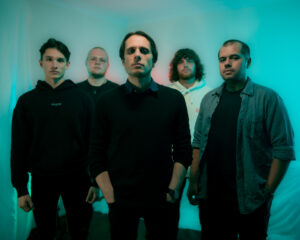
Matahari, the five-piece metalcore outfit hailing from the land down under, has burst onto the scene with their debut EP, Definition. Released in the midst of a global pandemic, Definition is a six-track masterpiece that showcases the band’s impeccable musicianship and thoughtful lyricism, while simultaneously pushing the boundaries of the djent genre. Led by the dynamic vocals of Thomas Rech, the band features the extraordinary talents of Alan Flindell and Jonas Olausson on guitar, Connor Roberts on bass, and Alex Bikovsky on drums.
In an interview with Happy Mag, Alan and Connor delve into their daily routines, creative communities, and sources of inspiration. For Alan, creativity is a family affair, as his creative community includes family, housemates, coworkers, and bandmates alike. Meanwhile, Connor’s creative circle is largely composed of former university classmates, but he’s eagerly looking to expand his network through his work. Alan’s recent read, “The Subtle Art of Not Giving a F*ck,” has granted him a fresh perspective on mental health, while Connor’s recent viewing of “Everything Everywhere All At Once” has taught him to appreciate the simple things in life, especially during difficult times.
Matahari’s sound is heavily influenced by some of the biggest names in the genre, including Northlane, Periphery, Spiritbox, and Karnivool. Alan explains that these bands have had a profound impact on his writing and recording process, and it’s clear from listening to Definition that this influence has resulted in something truly special. With their ability to flawlessly merge thoughtful lyrics and pristine metalcore, Matahari is a band that has the Australian music scene buzzing, and for good reason. Keep an eye on these rising stars, as they’re undoubtedly on the fast track to stardom.
Happy: What are you up to today?
Alan: Today I just had a rest day from work and band work for a bit. Worked a bit on the drum mix for our upcoming Drum playthrough of Machines. Had a movie night with my partner.
Connor: Today I’m spending time with my family for a birthday so I’m really excited for that, I always love a reason to see my family.
Happy: Tell us about your average day.
Alan: My average day depends on what’s happening in my life at the moment. But recently it would be working on either promo for the band or making content for the band or organising/helping organise gigs, either before or after my job, depending on if I work early or late, as I work in the AV sector. Some days I don’t have work as well due to my job being dependent on events that are happening. On the days that I don’t work on my AV job, I just take my day slow. Watching youtube videos, series/movies, working on band stuff (if there are any I need to work on), playing some games sometimes, practice guitar sometimes and ultimately ending my day by video calling my partner, as she lives out of state.
Connor: My average day usually consists of work at whatever event I’m currently working, or at the coffee Roastery I work at. During the week I’ll usually have some kind of rehearsal for a band or artist I’m working with, and then it’s usually chill out and watch a movie or tv show with my housemates.

Happy: What about your ultimate day?
Alan: My ultimate day would be just chilling, watching TV, practice guitar and then go skateboarding with the mates for like 6-8 hours, grabbing some food nearby, and head home and call/spend time with my partner
Connor: My ultimate day would honestly be chilling with a book in the morning, having a jam with friends just getting creative playing whatever we want, and then having a night in with a bunch of mates chatting, drinking and listening to music or maybe watching a movie.
Happy: Tell us about your creative community.
Alan: My creative community is small. My friends from skating, from work, my housemate, my family, and Matahari are all creatives. 98% of my coworkers in my AV job are musicians. My job as a sound engineer for both live and studio is creative. My housemate is a drummer. A lot of my family play music or are in the creative industries. So pretty much a lot of the people I’m around are very artsy, so i’m very grateful to be around creativity constantly.
Connor: My creative community is mainly made up of the people I studied music with at uni, I play a lot with them, and this band is an extension of that with me and Alex meeting each other through studying together. I’m starting to expand this community through work and I’m so excited about that.
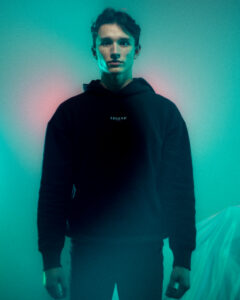
Happy: What did you read or watch last that opened your eyes and mind to a new perspective?
Alan: The last thing I’ve read that opened my eyes was a while back during COVID but it was called “The Subtle Art of Not Giving a Fuck” which gave me a new perspective with my mental health. Where it taught me to let things happen and that it’s okay to not have control over everything.
Connor: I recently watched Everything Everywhere All At Once and it blew me away. Such a crazy and absurd movie that at the end of the day pushes such a simple message of love, care, and appreciation for the normal things in life and how it’s good to have excitement for those things, even when it’s hard to keep those things in perspective with how crazy and intense life can be.
Happy: Can you tell us a bit about how the pandemic affected the making of your debut EP ‘Definition’ and how did you manage to write and record it from your homes?
Alan: Well some of the songs were demoed a long time before the pandemic but as I didn’t have work, I had a lot of time in my hands and decided to deal with it creatively. During this period, I was exposing myself to a lot of creative outlets, whether it’s skating or my youtube channel. Learning more things about mixing and recording, and fine tuning my mixing capabilities, which really motivated me to get the band moving and write/record music. That and my home studio setup being inches away from my bed. Jonas and I had weekly meetings (even now the band is still doing that a lot of the time), and we decided to fully commit to this project and find a full line up to push our songs to where we want it to be. Most of us have recording softwares, which is an integral part of our writing, and so we just recorded what we liked and sent it to each other.
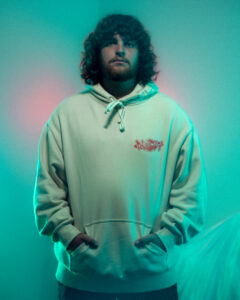
Happy: You’ve mentioned being influenced by artists such as Northlane, Periphery, Spiritbox, and Karnivool. Can you talk more about how their music has influenced your sound?
Alan: I feel that since I’ve been listening to these bands a lot, the way I write and play sort of mimics their style. It’s hard to explain but my brain starts thinking of the layers they use in their music, in ours. But it’s mostly unintentional. Like it just happens I guess. With bands like Periphery and Monuments (mainly Monuments), it’s their approach to groove and polyrhythms, as well as their production of their songs. Since the guitarist from Periphery, Misha Mansoor, posts a lot of mixing tutorials and writing tutorials, I watched those and got inspired by what and how he’s writing. That’s how our song “Far Too Late” came to life. With Monuments, their rhythmic style on guitar has rubbed off on me as well. Just on how groovy and aggressive it all sounds. A band called ERRA has inspired my writing a lot too, especially with rhythm and lead guitar layering. But another, simpler form is just learning and playing their songs as well. Picking up little nuances of their playing and trying to achieve that with mine.
Happy: Your debut EP features a mix of metal core, djent, and progressive metal. How do you approach blending these genres, and what do you hope to achieve with your music?
Alan: Well I don’t think we actively approach blending the genres haha. Like we’re all very into Djent and Metalcore, that it just somehow flowed into a melting pot of all these genres. I remember for the longest time with this band just not knowing what genre we fall under because of this. My goal with our music is mainly evolving our sound in a collaborative sense, as we’ve only had Connor and Alex in our band for not a long time, and both are incredible musicians. But also just making our music be as heavy and dynamic as possible, and to write for ourselves, not anyone else.
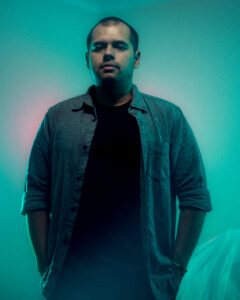
Happy: Your EP was mixed by guitarist Alan Flindell and mastered by Jeff Dunne, who have worked with other notable metal acts such as Crystal Lake, Veil of Maya, The Gloom in the Corner and Make Them Suffer. Can you talk about what it was like working with them and how they helped shape the final sound of ‘Definition’?
Alan: For me, the mixing stage was very hard, as it took a long time to get the mix right for my ears and for our sound. The main challenge with mixing is having a clear aim for our sound. But with recording it’s mainly to record every guitar and bass parts as tight as possible and as clean as possible, as well as vocals. With vocals I was looking at it in a compositional way as well. Trying to enhance Tom’s vocals as much as possible and as brutal as possible with his screams. So for me, the aim and goal in the recording stage was easier than mixing. With mastering, it took us 4 or 5 revisions to get it where it is now. But we opted on Jeff’s Stem mastering package, where we send him exports of each element of the mix, eg. drums, guitars, bass etc, separately and have it mastered that way. This means that he can add his own flavour and mix it a bit himself to get the best results. Working with him was awesome, as he would explain to us what he did and the reasons behind it, and his turnaround was pretty quick too, considering he’s on the other side of the world. I still don’t know what magic he put into it but it sounds incredible.
Connor: Alan did such an amazing job mixing this album and the whole band is so appreciative of the simply ridiculous amount of hours that he put into it. Alan definitely had a vision for this EP, I think it’s really his baby and he definitely achieved that vision, we are all so stoked with how it came out. Jeff was great to work with, he added just what we needed to get this sounding exactly how we wanted it.
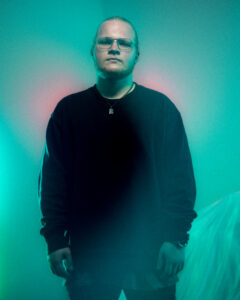
Happy: What role does analog gear play in your recording and mixing process, and do you have any favourite pieces of vintage gear that you rely on?
Alan: Well it doesn’t really play a big role in our recording and mixing at all I’m afraid. Like all our guitars and bass were recorded through my axe fx, which is a digital amp processor that has hundreds of amp models, cabs and fx. And our drums on the EP were virtual drums, using the PIV kit from GGD. This is due to the circumstances we were put in with the pandemic, but the drum parts are all written by Alex. And also the drum samples from that plugin sound insane! But we are planning to record live drums for our future records. Our upcoming drum playthrough for Machines are live drums, so we’re looking forward to how that’s sounding. I mean I am running analogue emulation plugins to help shape our sound, but unfortunately nothing really analogue on this record apart from the instruments and mics themselves. We did record the vocals on “Idols” at Debasement Studios with a 1980s Neumann U87 through an original LA2A Compressor and an Avalon VT-737SP preamp, but with the other songs we recorded through a Neumann TLM102 and a Rode NT-1a, and match EQed the recordings to match the sound of the U87 we used.
Happy: Melbourne has a thriving metal scene. How has being a part of that community influenced your music and creative process? Are there any local bands or artists that you’re particularly excited about right now?
Alan: For me musically and creatively it hasn’t really influenced me as I mainly listen to the bigger bands. But just coming to our friends’ shows has motivated me to want to gig and perform more, but I am still trying to build my networks in the Melbourne metal scene. As for local bands that I’m excited about, I’m excited about Ocean Sleeper, who we’ve worked with and currently working with their guitarist Ionei Heckenberg on the “Idols” music video and our future playthrough videos. I’m also excited about the guys in Earthbound, our friends at Furious George and Centralia, and Pendlehill.
Connor: The Melbourne metal scene can be a bit daunting honestly, there are so many amazing musicians and bands that it can be quite scary when you wanna throw your hat into that ring. At the same time that fills me with so much excitement at the potential of potentially working with a lot of the bands that I have loved for ages. For me personally a band that has blown up at lot recently that I love is Windwaker, they’re absolutely killing it and it’s so cool to see cause they are amazing. On the more local side I absolutely love the stuff that Furious George do and Shannon their drummer is a great friend of ours so we love working with them.
Happy: What role do you see music playing in shaping and reflecting the current culture, and how do you hope your music contributes to that conversation?
Alan: Well I feel that music is all part of us on many extreme levels both emotionally and spiritually. For me, and I know for a lot of people, it played an important role in maintaining a calm and stable mental and emotional health during the pandemic. As we are coming out of that rough period of time, I feel that music has allowed a lot of people, both artists/bands and the listener, to express themselves more than ever, especially as the restrictions have been lifted, especially this year. Shaping the way we communicate as people. But in terms of the current culture, music itself is a culture. It brings so many people, with many different backgrounds, together. Which is exactly what we need from the rough years. It has given life to the industry again. In terms on how we hope our music will contribute, for me, I honestly just do it for the love of it. I’m not expecting our music to make an impact with major issues, but as long as it’s impacting someone in a positive way, and that people like it, then I’m happy.
Happy: Most importantly what makes you happy?
Alan: Just giving. Seeing the reaction from people around me from the things I’ve done to enlighten or help them in some way, no matter how big or small, makes me happy. But musically, I would say playing live, and recording and mixing, but this can get too intense and overloading for my mind, so skating and just relaxing makes me happy.
Connor: Playing live makes me happy, sometimes with music and creative areas of life the mental drain and burnout can be real, and it can so easily lead to questions of whether I still want to pursue this. That all instantly leaves as soon as I’m up on stage playing, and I hope it’s always gonna be that way.
Stay tuned to Matahari here.